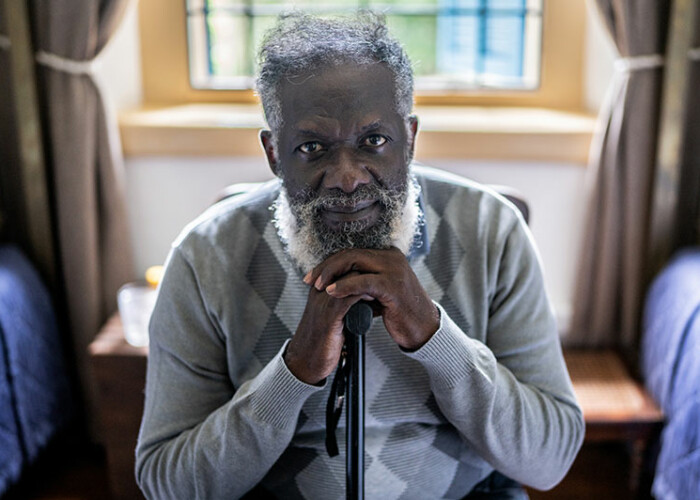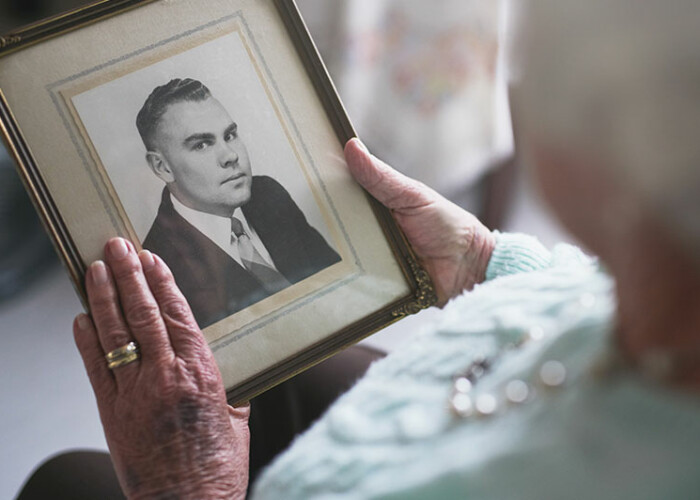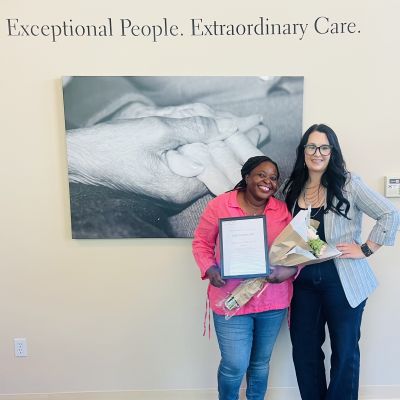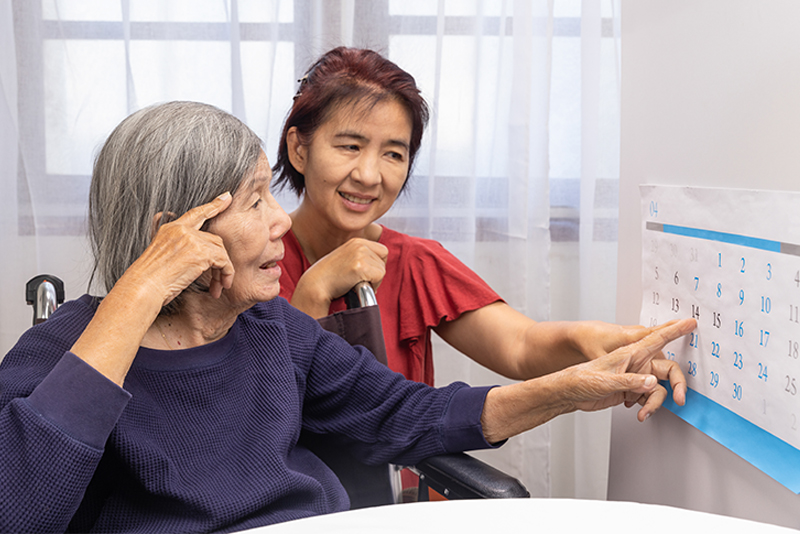Caregiver Support Tip
Tips to Incorporate Fruits and Veggies into a Senior’s Diet
Learn how to incorporate fruits and veggies into a senior’s diet today!
Most people, including seniors, prefer carbs to carrots. And that can make it challenging to meet a senior’s nutritional needs. The Center for Disease Control and Prevention shares that only one in 10 older adults is meeting the recommendation of at least two servings of fruit and three servings of vegetables each day. Numerous studies have revealed that older adults who do follow these guidelines reduce their risk for heart disease, diabetes, as well as other chronic health issues, and ultimately live longer lives.
When you run into challenges finding a diet that supports a senior’s nutritional needs, you may have to find creative ways to incorporate fruits and veggies into a senior’s diet. For example:
Add a crunch. If the senior loves a crunch, there … Read More »
What People With Alzheimer’s Want You to Know
Improve communication with someone you love by learning what people with Alzheimer’s want you to know.
If you’ve ever wished you could look a senior with dementia in the eye and understand exactly what they’re thinking, we just might be able to help you with that! Communicating effectively with someone with dementia isn’t easy, especially as the disease progresses. Following are several statements provided by people with Alzheimer’s to give you some insight into what it feels like to live with the disease.
You haven’t lost me. A diagnosis of dementia does impact a person in many ways, but it doesn’t change the essence of who they are. “I love the same people and doing the same things I did before my diagnosis,” explains Dale Rivard. It’s essential to recognize that while memory and cognitive abilities may decline, the … Read More »
Senior Technology and How It’s Making It Easier Than Ever to Age in Place
“You are always free to choose what you do with your life. To make changes in your future, make new choices today.” – Brian Tracy
Learn about the latest innovations in senior technology and how they can help someone you love.
Selecting where to reside in our older years isn’t easy. Nearly all older adults prefer to remain at home for a lifetime, but it is not without challenges. Will it be safe? What about mobility issues or other physical limitations? What happens if the person falls and is unable get up?
The good news is, there are a wide variety of solutions that make aging in place possible for older adults. Senior technology, for example, is continually developing and evolving, providing answers to the challenges that could surface as we grow older. Just look at a few … Read More »
Broken Heart Syndrome: How to Help a Loved One Who Is Grieving
It’s not easy to know how to help a loved one who is grieving, but these tips are a great place to start.
In his documentary about grief, George Shelley uses an analogy of glitter. Toss a handful of glitter into the air, and it’s going to settle into all the cracks and crevices of the room, impossible to fully sweep up and remove. Those who have lost a loved one can relate. Yet in certain instances, grief could be so overwhelming that it could result in a serious and aptly named condition: broken heart syndrome.
Broken heart syndrome is a very real physical condition from the intense stress experienced in certain types of grief (such as one spouse losing the other after decades of marriage). The medical term is takotsubo cardiomyopathy, a temporary enlargement of the heart … Read More »
The Link Between Hearing Loss and Dementia You Need to Know About
Understanding the link between hearing loss and dementia is crucial to know the steps you can take to reduce the risk of cognitive decline.
Are you finding the need to turn the TV up louder for someone you love? Speaking more loudly? Repeating things the person missed hearing the first time? Hearing loss in older adults is not uncommon. But new scientific studies are pointing to a startling link between hearing loss and dementia.
How Hearing and Cognitive Functioning Are Linked
There are a number of hypotheses scientists are exploring to explain the connection between hearing loss and an increased risk of dementia:
The brain’s memory and thinking ability are affected when it has to work harder to strain to hear and to fill in the gaps when communication is missed.
An older brain shrinks more rapidly because of hearing … Read More »
Understanding Cultural Competence in the Context of LGBTQ+ Senior Care
The highest quality LGBTQ+ senior care begins with understanding and implementing cultural competence practices.
As we strive to create compassionate and supportive environments for seniors, the concept of cultural competence takes center stage, particularly when addressing the unique needs of LGBTQ+ individuals in their later years. In the context of LGBTQ+ senior care, embracing cultural competence is essential to ensure that each person receives the respect and understanding they deserve as they navigate the intricacies of aging.
What Is Cultural Competence?
At its core, cultural competence refers to the ability of individuals or organizations to effectively interact with people from different cultures. It involves understanding, respecting, and responding to the needs and preferences of individuals from diverse backgrounds. In the context of LGBTQ+ seniors, cultural competence extends beyond a general understanding of aging to encompass the unique challenges, … Read More »
Navigating the Unique Challenges of Older Adults in the LGBTQ+ Community
Older adults in the LGBTQ+ community face a number of hurdles that we all need to understand.
When it comes to growing older, the experiences of seniors are as diverse as the colors of the rainbow. Within this spectrum, older adults in the LGBTQ+ community often face unique challenges that warrant our attention and understanding. As a leading home care provider in Novato and the surrounding areas, we know that fostering inclusivity is crucial for providing support to all members of our community. It begins by understanding some of the hurdles specific to the LGBTQ+ population that need to be overcome.
Isolation and Social Stigma:
One of the key challenges confronting LGBTQ+ seniors is the potential for isolation and the enduring social stigma that has persisted throughout their lives. Many individuals from this community grew up in an … Read More »
Feeling Overloaded With Caring for a Loved One? These Tips Can Help!
If you’re feeling overloaded with caring for a loved one, we have three simple steps you can take to ease the strain.
If today’s to-dos seem like a lot more than you are able to possibly squeeze into 24 short hours, you are not alone! Family caregivers frequently are feeling overloaded with caring for a loved one and the daily required tasks: Personal care and hygiene. Planning and preparing meals. Medical appointments. Planning activities that are purposeful and enjoyable for the older adult. Shopping and other errands. Housework and laundry. And all of this is on top of meeting the requirements of your own spouse, children, household, and if there is any time left over, yourself!
We invite you to hit the pause button for just a minute, take a deep breath, and put into action these tried-and-true … Read More »
Take These Steps to Avoid Overmedication and Adverse Medication Reactions in Seniors
Taking too much or too little of a medication or taking it the wrong way can lead to adverse medication reactions in seniors.
The days of “take two aspirin and call me in the morning” have morphed into “take two of these…and two of these…and maybe one of those, too!” Nearly forty percent of seniors are taking at least five different prescription medications each day – not to mention vitamins, supplements, and OTC meds. It is easy to understand why overmedication and adverse medication reactions in seniors are extremely common.
Take these actions to avoid medication problems for someone you love:
Make a list, and check it twice. Create a list of every one of the medications – both over-the-counter and prescription – that the person is currently taking. Share the list with all of their healthcare providers, and … Read More »
The Most Important Vitamins for Older Adults
With all of the options on store shelves, which are the most important vitamins for older adults?
Minerals, vitamins, and supplements – oh my! Nearly three in four older adults are taking them; but are they really needed as we get older? After all, a balanced and healthy diet offers older adults essential nutrients. But there are specific areas of deficiency that may make a case for the addition of a supplement. Make sure to talk with the doctor before making any changes, but with their recommendation or approval, consider the following important vitamins for older adults:
Calcium
Aging bones are susceptible to breaks and fractures when calcium intake is inadequate. This is especially true for post-menopausal women, with a full 50% of those over age 50 breaking a bone because of osteoporosis. However, men are also in … Read More »

















